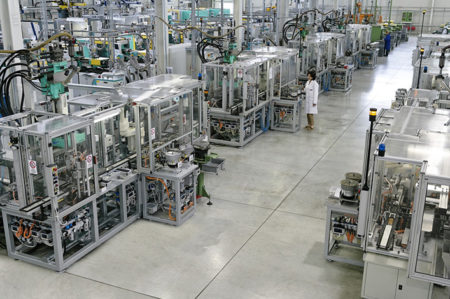 “Having semi-automatic or fully automatic assembly lines has always been part of our business model,” says Paul Elvinger, Member of the Executive Board at Cebi. “We want to go further and take advantage of the opportunities brought by digitalisation and Industry 4.0, but this means breaking new ground and tackling very complex technological challenges.”
“Having semi-automatic or fully automatic assembly lines has always been part of our business model,” says Paul Elvinger, Member of the Executive Board at Cebi. “We want to go further and take advantage of the opportunities brought by digitalisation and Industry 4.0, but this means breaking new ground and tackling very complex technological challenges.”
Building an in-house Internet of Things
Cebi manufactures electromechanical products for the automotive and household appliances industries and is the world leader in automotive washer systems. Its production system consists of machines of various ages provided by different suppliers, which each use their own software, systems and communication protocols. The data produced tend to be incompatible, preventing the machines from speaking to each other. In order to find a way of transforming this heterogeneous machine park into a communicating Internet of Things, Cebi turned to the Interdisciplinary Centre for Security, Reliability and Trust (SnT) of the University of Luxembourg.
“We easily found the right contacts at the university and they were very interested in working with us,” says Mr Elvinger. “A team from the SnT spent 10 days at our factory to discover our production environment and undertake some tests. As this went well, we decided to set up a research project together that also includes Data Things, a spin-off from the SnT that specialises in data analytics, machine learning and automated decision systems supported by artificial intelligence.”
When designing the project and preparing an application for R&D funding from the Ministry of the Economy, Cebi also benefited from the support of the national innovation agency, Luxinnovation. “The help from the national funding and cluster experts at Luxinnovation allowed us to prepare a robust project with a well-structured collaboration between the three partners, and our funding request was successful,” says Mr Elvinger.
Leading the way in smart manufacturing
By implementing a cyber-physical production system that is more efficient and able to monitor potential problems and take preventive action, Cebi Luxembourg aims to improve its “Overall Equipment Effectiveness”, or the proportion of manufacturing time that is truly productive. “Our goal is to have a lean, efficient and flexible production that allows us to optimise our stocks,” Mr Elvinger points out. “If the project goes as well as we hope, we will share the methods and technologies put in place here in Luxembourg with the global Cebi group.”
The collaboration with the SnT and Data Things is essential. “As Industry 4.0 is still in its infancy, there are no established standards and no one really knows today what technologies will persist in the future,” says Mr Elvinger. “It is important for us to have neutral input from the SnT researchers who do not promote a proprietary solution but have an independent point of view.” He also finds it very interesting to have the young start-up Data Things, established as late as in 2017, on board: “You collaborate differently with a start-up than with a regular supplier. They focus on finding solutions and developments can happen very quickly, so we must be more agile and reactive. In terms of change management and flexibility of the project work, this is an opportunity for us.”
The Luxembourg Cluster Initiative facilitates R&D-related public-private partnerships in Luxembourg. Please contact the cluster managers to discover the opportunities.
Luxinnovation contributes to the economic development of Luxembourg by fostering innovation, fuelling international growth and attracting foreign direct investment supported by: Ministry of the Economy, Ministry for Higher Education and Research, Luxembourg Chamber of Commerce, Luxembourg Chamber of Skilled Crafts and FEDIL – The Voice of Luxembourg’s Industry.

